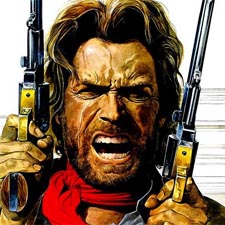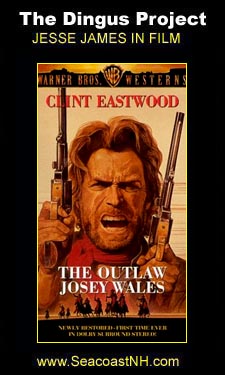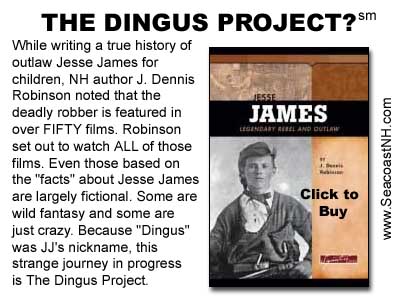| The Outlaw Josey Wales |
 THE DINGUS PROJECT
THE DINGUS PROJECT
Jesse James in Film #23
Could Clint Eastwood’s bushwacker Josey Wales be all that Jesse James might have been? Like the fictional James, Wales is a force for good in an evil environment. Unlike the real outlaw, Wales only shoots and robs the bad guys.
The Outlaw Josey Wales (1976)
135 min - Western - 30 June 1976 (USA)
Revenge is at the heart of the Jesse James legend. It was revenge against the Union and the Jayhawkers, some believe, that turned the James and Younger brothers into outlaws after the Civil War. And it is revenge that drives fictional ex-bushwacker Josey Wales.
The film opens with Wales (Clint Eastwood) on his family farm before the War. A band of "Redlegs" raid his home and kill his family. Wales signs up with the Bushwackers under Bloody Bill Anderson to fight back. Jesse James belonged to the same guerilla band. Although he doesn’t appear here, Jesse James’ fingerprints are all over this film. Here Josey Wales is the final Confederate holdouts, the last leader of the Lost Cause, still fighting the Civil War. When his Bushwacker companions are ambushed and killed when trying to surrender, Josey and a young friend, like Frank and Jesse, become outlaws.
 With his reputation as a Missouri outlaw, Josey Wales is hunted wherever he goes, but like Jesse James, he proves to be uncatchable. Along the way he picks up a likeable Indian partner (played by Chief Dan George, who gave a vigorous performance at age 76) and sharpshooting squaw Little Moonlight (played by Geraldine Keams seen later in "Northern Exposure" and "Twin Peaks"). They save a Unionist grandmother and her willowy blonde granddaughter from a band of Commancheros and deliver the motley family to a faded Texas ranch.
With his reputation as a Missouri outlaw, Josey Wales is hunted wherever he goes, but like Jesse James, he proves to be uncatchable. Along the way he picks up a likeable Indian partner (played by Chief Dan George, who gave a vigorous performance at age 76) and sharpshooting squaw Little Moonlight (played by Geraldine Keams seen later in "Northern Exposure" and "Twin Peaks"). They save a Unionist grandmother and her willowy blonde granddaughter from a band of Commancheros and deliver the motley family to a faded Texas ranch.
A film school analysis might explore the moral decisions made by Josey Wales and Jesse James after the Civil War. In the comparison, Wales wins. Although both are motivated by a similar background and a desire for revenge against the North, Wales does not steal. He kills only when pursued or in the defense of the weak, while Jesse James murdered innocent bystanders and those he suspected of betraying him. Wales keeps his moral compass true, and reserves his wrath for those who intend to harm him or the innocents he comes upon in his travels.
In a sense, Josey Wales serves as an example of what Jesse James might have been, but was incapable of becoming. Forged in the same confusing and violent times, Wales does not get caught up in his own legend. He does not live a double life, or get emotionally involved with others. Wales knows that his anger and misfortune and reputation have made him a man alone. Robbed of his original family and any hope of future happiness, Wales is simply a man trying to survive. "Dying isn’t much of a living," he tells a bounty hunterm whom he urges to simply walk away. But the bounty hunter returns, and dies in a reluctant gunfight. Cursed by his own superior skill, Wales lives to fight another day.
After arriving in Texas, even the Unionist granny comes to accept Wales as her saviour and offers up this prayer: "Thanks a lot for Josey Wales who you changed from a murdering bushwacker on the side of Satan to a better man." Unlike Jesse James, Josey Wales is the real anti-hero – a moral man in an immoral world.
When the whole group gets trapped in a house by the Commanche – Granny, Lone Watie, Moonlight and Laura Lee – Josey rides off alone and talks the Indian leader into a peaceful compromise. Things are looking up for a few minutes. Clint even gets a night with Laurie Lee. But then the Union soldiers, who seem to have been chasing Josey for years, arrive in town.
Sensing trouble, Josey prepares to leave ("Sometimes trouble just follows a man.") and immediately bumps into the Union army, the bounty hunters and assorted bad guys. But with the help of his motley gang, the baddies are all but massacred – all but the original soldier who murdered his wife and family in the opening scene. Josey dispatches him and rides off into the sequel.
Along the way, he delivers his brief philosophy of life to his companions:
"If things look bad and it looks like you’re not going to make it, then you gotta get mean, I mean plumb mad-dog mean. Cause if you loose your head and give up, then you neither live nor win. That’s just the way it is."
Copyright © J. Dennis Robinson and SeacoastNH.com.
INTERNET MOVIE DATABASE web site link


